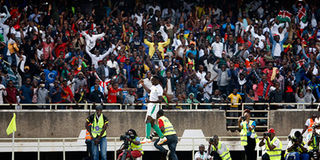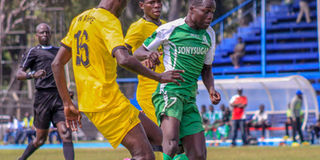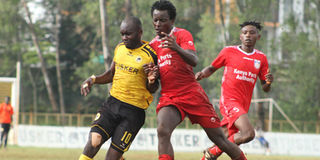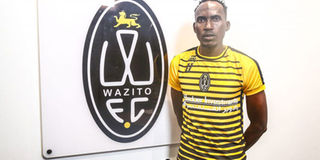SportPesa’s exit sends shockwaves in football as league, teams struggle

Kariobangi Sharks' Duke Abuya celebrates his goal against Everton during their friendly match at the Moi International Sports Centre, Kasarani on July 7, 2019. PHOTO | CHRIS OMOLLO |
What you need to know:
- Bumpy pitches threaten players’ careers in wake of failed promise of five new stadiums
- Other than being KPL’s title sponsor, the giant gaming firm also sponsored Gor and AFC
- The exit of SportPesa also meant that all the top-tier clubs would no longer get monthly grants from the KPL. This has had far-reaching repercussions.
- Cash-strapped Sony Sugar was expelled from the league after dishing out three walkovers in the ongoing season.
The ending year has marked a difficult period for the Kenyan Premier League (KPL).
Gor Mahia won the title in 2018/19 season in May despite having a very congested schedule due to a change in the local footballing calendar that meant the league kicked off mid-year.
K’Ogalo had continental duties to deal with but still defied the odds to do well at home and retain the title.
The 2019/20 season kicked off on a sad note, with giant gaming company SportPesa which was the official title sponsor of the KPL terminating all its sponsorship deals in Kenya. The KPL management and league teams were not prepared for this and it has affected the league drastically. AFC Leopards and Gor Mahia, who enjoyed separate shirt sponsorship deals with SportPesa were affected, the exit of the betting firm all but crippling the two teams.
Players from both clubs have now gone for months without pay while the coaches, Andre Casa Mbungo (AFC Leopards) and Steven Polack (Gor Mahia) have expressed their desire to leave the clubs due to the financial constraints.
SONY AXED
The exit of SportPesa also meant that all the top-tier clubs would no longer get monthly grants from the KPL. This has had far-reaching repercussions.
Cash-strapped Sony Sugar was expelled from the league after dishing out three walkovers in the ongoing season.

Sony Sugar forward Kevin Omundi (centre) vies for the ball with Wazito defender Lloyd Wahome (left) and midfielder Joshua Nyatini during their Kenyan Premier League match at Kenyatta Stadium, Machakos on November 2, 2019. Wazito won 4-3. PHOTO | COURTESY
And a struggling Chemelil Sugar has already dished out two walkovers and are left with just one more and they are expelled as well. So bad is the situation that the KPL convened a special Governing Council Meeting in October to seek a way out following requests by several clubs that the league be halted until the financial crisis is sorted.
Chemelil chairman Collins Agai believes the problem is bigger than it appears, with almost every club in the league struggling to make it to match days.
“We are among the clubs that wanted the league to be suspended to send a strong message to the government to intervene and fund the KPL through the Sports Fund. Chemelil Sugar Company has not been in operation for a while and we owe the players salary arrears stretching back more than 10 months. We have no funds. Unless the Government intervenes, the league is going to collapse and only teams that are backed by big companies and organisations like Bandari, Tusker and KCB will survive,” he told Nation Sport.
STATE OF OFFICIATING IN THE KPL
With the KPL struggling financially, the burden of paying referees was passed on to equally cash-strapped teams and this, too, has become a big problem, causing delayed kick offs in several matches as referees demand payment before officiating matches.
The credibility and competency of the match officials has also been questioned as it has become easy to influence the outcome of matches. This is how low the Kenyan Premier League has sunk and it calls for a multi-faceted approach from all the football stakeholders to bring back the glory.
The fall comes with various lessons. For instance, the KPL must strive to have as many partners as possible on board – a title sponsor alone is not enough. The league must employ a competent internal marketing team to actively seek sponsorship opportunities. Teams also need to be self-reliant and stop depending on the grants from KPL that will never be enough.
Football has evolved to become a multi-billion shilling industry and Kenyan clubs have been left behind. They must change with the times or become extinct. With KPL’s mandate to manage the top-tier league expiring in 2020, it will be interesting to see what Football Kenya Federation (FKF) will do to revive the league that has taken a slump.
POOR STATE OF PITCHES
It is impossible to review Kenyan football without mentioning the lack of quality pitches and the poor state of the few fields that host top-tier league matches. The Government has failed to fulfill its promise of building five world-class stadiums but even the few available are not properly maintained.
Kenya’s best sports facility, Moi International Sports Centre, Kasarani, cannot comfortably host double-headers on a rainy afternoon due to poor drainage and workmanship. The stadium has a leaking roof, playing surface gets swampy whenever it rains and toilets are always blocked.
Kenyatta Stadium in Machakos is overused and the playing surface is pathetic. There is nothing positive to write about the East African Breweries Limited-owned Ruaraka Stadium while the Bukhungu Stadium in Kakamega lacks proper drainage.

Tusker forward Timothy Otieno (left) tussles for the ball with Bandari defender Brian Otieno (second right) as Mohamed Siraj looks on during their Kenyan Premier League match at Ruaraka grounds on December 1, 2019.
There’s no single stadium in Kenya good enough to host top-tier matches. Teams can only hope that Nyayo National Stadium will be re-opened soon. Like their progressive counterparts elsewhere, Kenyan clubs should think about owning their own stadiums.
MONEY DOES NOT BUY INSTANT SUCCESS
Flamboyant, controversial and outspoken businessman Ricardo Badoer bought controlling stake in Wazito FC and pumped in money to transform the team into one of the “biggest clubs in Africa”.
As soon as the club won promotion to the KPL, he overhauled the playing unit, doing away with “average players” and bringing in some big names like former Gor Mahia duo of Abouba Sibomana and Karim Nizigiyimana, highly-rated goalkeeper Kevin Onyango, Elvis Rupia, Musa Masika among others.

Former Gor Mahia defender Karim Nizigiyimana was one of Wazito's big signings in the primary transfer window. PHOTO | COURTESY
Cumulatively, Wazito signed up 18 players and released as many. In came former Harambee Stars coach Stanley Okumbi and Fred Ambani to spearhead the team on its return to the KPL.

Kenyan international defender Bernard Ochieng' has joined Wazito FC from Vihiga United. PHOTO | COURTESY
With a new bus, an office and a merchandise shop, all seems to be going well for the moneybags off the pitch but on it, they have found the going tough and have now started restructuring again.
Okumbi and Ambani were sacked and Mt Kenya United’s former coach Melis Medo took over but he, too, was shown the door after just four matches. Briton Stewart Hall is now in charge, assisted by Frank Ouna. The team is currently 13th in the KPL standings with 11 points, having won just twice, drawn five times and lost seven matches so far this season.
The 2018/19 season has been tough for clubs and the league mainly due to financial challenges. Word has it that the KPL is close to securing a multi-million shilling sponsorship deal with another gaming firm while Gor Mahia are also courting a new sponsor.





